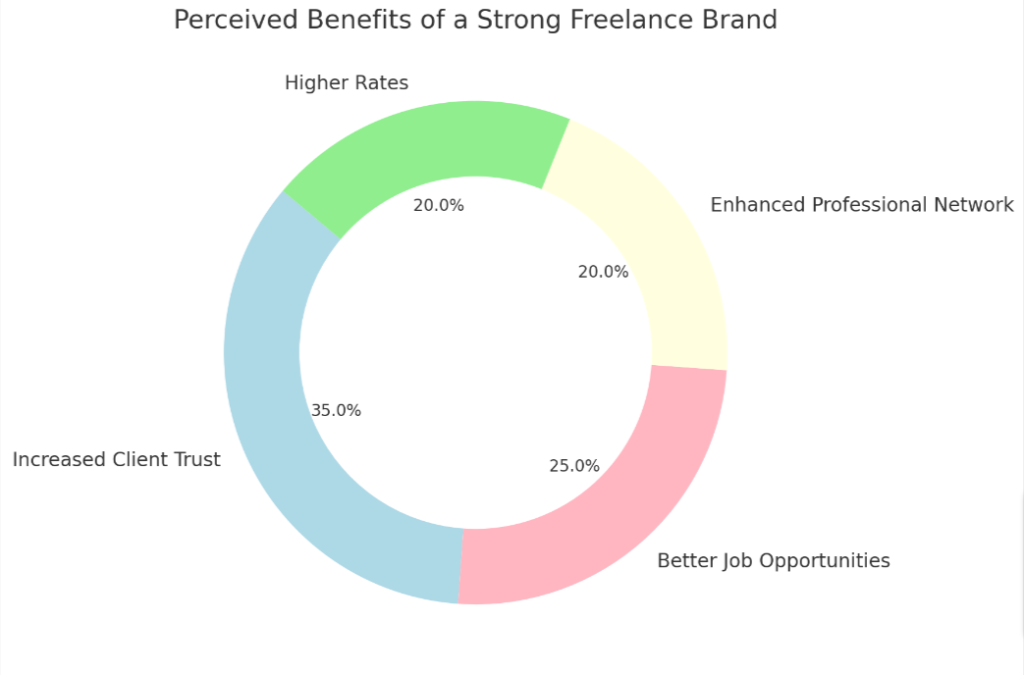Beyond the Pen: Crafting a Distinctive Freelance Identity
Are you a talented freelance writer but struggling to catch the attention of dream clients? Here’s an interesting fact: around 60% of freelancers state that building their personal brand helped them successfully grow their business.
This blog post will guide you through actionable steps on how to create and maintain a powerful freelance brand that goes beyond just showcasing your writing skills. Ready to stand out from the crowd? Let’s get started!
Key Takeaways
- Defining your personal brand and identifying your target audience are crucial for building a successful freelance brand.
- Utilizing social media platforms and maintaining a consistent voice help enhance your online presence and attract potential clients.
- Creating a professional website, showcasing your portfolio, utilizing testimonials, and maintaining a strong online reputation are essential steps in establishing credibility and attracting clients.
- Networking with other freelance writers can expand your network, provide opportunities for collaboration, and enhance your personal brand.
The Power of Personal Branding for Freelance Writers
Defining your personal brand and identifying your target audience are crucial steps in establishing a strong freelance brand. Utilizing social media platforms and maintaining a consistent voice further enhance your online presence for potential clients to find you easily.
Defining your personal brand
Underlying your freelance pursuit is the concept of a personal brand. This represents how you present yourself both online and offline to potential clients. It’s essential to establish a distinct identity that sets you apart in the competitive world of freelancing.
Your personal brand communicates who you are as a professional, reflecting your values, skills, passions, and services offered. Essentially, it embodies the unique quality that makes you unforgettable in the eyes of clients.
Crafting an authentic personal brand involves introspection and consistent efforts; but once achieved, it paves the way for credibility and recognition among industry peers and prospects alike.
Identifying your target audience
Defining your target audience is a vital step in building your freelance brand. It helps tailor your marketing efforts and services more effectively. Begin by analyzing who benefits most from your writing or creative services.
Consider their industry, job title, company size, geographical location, challenges they face that you can solve with your skills.
Demographics alone are not enough; consider psychographic factors as well. Dive into the mindset of clients you wish to attract- their preferences, buying habits, hobbies and values.
Insight into these elements will guide how you approach them with communications which resonate deeply, creating stronger freelancer-client relationships for long-term success.
Leveraging social media
In the digital age, social media platforms hold immense power for freelance writers looking to build their brand. Sites like Twitter, Facebook, and LinkedIn are not just about posting selfies and holiday pictures.
They’re tools freelancers can use to connect with potential clients, share samples of their work and engage in meaningful interactions that showcase your personality and style.
Instagram is another platform especially useful for writers who wish to adopt a more visual approach to self-promotion. You could post images related to your writing process or inspirational quotes along with captions written in your unique voice.
Algorithms favor regularly updated profiles so post consistently without compromising content quality or authenticity. Personal branding on social media requires both strategy and originality but offers high returns when done right.

Establishing a consistent voice
Consistency is key when it comes to establishing your freelance brand. By maintaining a consistent voice in all of your written content, whether it’s on your website, blog posts, or social media updates, you can create a strong and recognizable identity for yourself as a freelance writer.
This consistency helps build trust with your audience and sets you apart from other freelancers. It’s important to develop a clear tone and style that reflects your expertise and resonates with your target audience.
Whether you choose to be formal or conversational, make sure to consistently use that tone throughout all of your communications. This will help establish you as an authority in your niche and attract the best clients for your freelance career.
Building an Online Presence
Creating a professional website, showcasing your portfolio, utilizing testimonials, and maintaining a strong online reputation are essential steps in establishing your freelance brand.
Don’t miss out on these valuable strategies to attract clients and build credibility in the freelance industry!
Creating a professional website
Creating a professional website is crucial for establishing your freelance brand. It allows you to showcase your skills, experience, and portfolio in the best possible light. A well-designed website can help attract potential clients and set you apart from the competition. Here are some key elements to consider when creating your professional website:
- Clear and engaging homepage: Make sure your homepage provides a clear overview of who you are and what you offer. Use captivating visuals and concise copy to grab visitors’ attention.
- Easy navigation: Ensure that your website is user-friendly with a logical menu structure. Visitors should be able to easily find the information they need without getting frustrated.
- Showcase your portfolio: Highlight your best work by creating a dedicated portfolio page. Include samples that demonstrate your range of skills and expertise.
- Testimonials and client reviews: Display positive testimonials from satisfied clients on your website. This helps build trust with potential clients and showcases the quality of your work.
- Contact information: Make sure it is easy for visitors to contact you by including prominent contact details on every page of your website.
- Mobile-responsive design: Optimize your website for mobile devices as an increasing number of people access the internet from their smartphones or tablets.
- SEO optimization: Pay attention to search engine optimization (SEO) techniques to improve visibility in search engine results pages (SERPs).
Showcasing your portfolio
To showcase your portfolio effectively, follow these simple steps:
- Select your best work: Choose a selection of projects that highlight your skills and expertise. Focus on quality over quantity.
- Create an online portfolio: Build a professional website or use platforms like Behance or Dribbble to display your work. Make sure it is easy to navigate and visually appealing.
- Include project details: Provide a brief description of each project, outlining the objectives, challenges, and solutions you implemented. Use clear and concise language.
- Use visuals: Incorporate high-quality images or videos to showcase your work visually. This will grab the attention of potential clients and enhance their understanding of your skills.
- Highlight client testimonials: Include positive reviews or recommendations from past clients to build trust and credibility. These testimonials can reinforce the quality of your work.
- Update regularly: Keep your portfolio up-to-date by adding new projects as you complete them. This demonstrates that you are actively engaged in your field and continuously improving.
- Share it widely: Promote your portfolio across various channels such as social media, LinkedIn, or industry forums to reach a wider audience and attract potential clients.

Utilizing testimonials
Utilizing testimonials is a powerful way to build your freelance brand and establish trust with potential clients. Positive reviews and recommendations from satisfied customers can help you showcase your skills and expertise, giving others confidence in your abilities as a freelancer.
When prospects see that others have had a positive experience working with you, they are more likely to choose you over your competitors. By strategically placing testimonials on your website or social media platforms, you can create a stronger brand presence and attract the best clients for your freelance career.
Maintaining a strong online reputation
Regularly monitoring and managing your online reputation is essential for building a strong freelance brand. Responding promptly to customer feedback, both positive and negative, demonstrates professionalism and shows that you care about the satisfaction of your clients.
Engaging with your audience on social media platforms by sharing relevant content and responding to comments helps to establish trust and credibility. Additionally, regularly updating your website or portfolio with new projects or testimonials showcases your skills and expertise, attracting potential clients to work with you.
By consistently maintaining a positive online presence, you can build a solid reputation in the freelance industry and attract the best clients for your career growth.
Networking and Collaborating
Connect with other freelance writers to expand your network, share insights and opportunities, and collaborate on projects that can enhance your personal brand.
Connecting with other freelance writers
Connecting with other freelance writers can be a valuable way to expand your network and learn from others in the industry. Collaborating with fellow freelancers opens up opportunities for referrals, partnerships, and even joint projects that can enhance your brand and attract new clients.
Engaging with other professionals through online forums, social media groups, or attending industry events allows you to exchange insights, share resources, and stay updated on the latest trends.
By connecting with other freelance writers, you can build relationships that not only provide support but also help you grow your career as a freelancer.
Utilizing industry events and platforms
Industry events and platforms can greatly benefit freelance writers by providing opportunities for networking, collaboration, and exposure. Here are some ways you can make the most of these events and platforms:
- Attend relevant conferences and workshops: Participate in industry-specific events to connect with fellow professionals, learn about current trends, and gain valuable insights.
- Engage in online forums and communities: Join online platforms where freelancers discuss their experiences, exchange tips, and offer support. Contribute to discussions and establish yourself as an active member.
- Leverage social media groups: Find and join targeted social media groups related to your niche or industry. Share your expertise, engage with others’ content, and build relationships with potential clients.
- Become a guest speaker or panelist: Seek opportunities to speak at conferences or participate in panel discussions related to your field. This positions you as an authority figure and expands your reach within the industry.
- Collaborate with influential individuals or brands: Partner with established professionals or respected brands on joint projects or co-author articles. This association can lend credibility to your personal brand.
- Volunteer for industry-related organizations: Offer your services as a volunteer for associations or organizations connected to your area of expertise. This not only helps you give back but also exposes you to new contacts and potential clients.
Leveraging referrals and testimonials
Leveraging referrals and testimonials is a powerful strategy for building your freelance brand. When previous clients speak highly of your work and recommend you to others, it establishes trust and credibility.
Potential clients are more likely to hire freelancers who come recommended by someone they trust. By actively seeking out testimonials from satisfied clients and showcasing them on your website or portfolio, you can attract new clients and strengthen your reputation as a freelancer.
Additionally, reaching out to past clients for referrals can lead to valuable connections and new opportunities in the future.
Maintaining Your Personal Brand
Stay true to your niche, regularly update your online presence, develop a tagline, and offer consulting and coaching services. Learn how to maintain and strengthen your freelance brand in this blog post.
Staying true to your niche
To build a strong freelance brand, it’s crucial to stay true to your niche. By focusing on a specific area of expertise, you can establish yourself as an expert and attract clients who are looking for your particular skills.
Avoid the temptation to be a jack-of-all-trades; instead, define your niche and hone your craft within that field. This will help you stand out from the competition and build a reputation as someone who delivers exceptional work in their chosen specialty.

Regularly updating your online presence
Regularly updating your online presence is crucial for building and maintaining your freelance brand. Here’s how you can do it:
- Post new content on your professional website or blog consistently.
- Update your portfolio with your latest work samples.
- Share updates, insights, and relevant industry news on social media platforms.
- Engage with your followers by responding to comments and messages promptly.
- Showcase any awards, accolades, or certifications you have received.
- Refresh your profile pictures and cover photos regularly to keep them current.
- Review and update your bio or About Me section to reflect any changes in your skills or services.
- Regularly check and update the accuracy of your contact information.
- Monitor and respond to online reviews or testimonials about your work.
Developing a tagline
Crafting a memorable tagline is an essential step in building your freelance brand. A tagline is a short, catchy phrase that encapsulates the essence of your brand and sets you apart from the competition.
It should communicate who you are, what you do, and the value you bring to clients. Take some time to brainstorm ideas and consider what makes your services unique. Keep it simple and easy to understand, while also making sure it resonates with your target audience.
Once you have developed your tagline, incorporate it into all aspects of your online presence – from your website to social media profiles – to strengthen your personal brand identity.
Offering consulting and coaching services
Offering consulting and coaching services can be a valuable addition to your freelance brand. By sharing your expertise and guiding others in their professional journeys, you not only establish yourself as an authority in your field but also create additional income streams.
Through one-on-one consultations or group workshops, you can provide personalized advice, strategies, and support to help individuals reach their goals. This allows you to leverage your knowledge and experience while making a positive impact on others’ careers.
Whether it’s providing writing tips or helping clients navigate the freelancing industry, offering consulting and coaching services enhances your brand by showcasing your skills and commitment to helping others succeed.

Conclusion
Building your freelance brand is essential for standing out in a competitive industry. By defining your personal brand, leveraging social media, and consistently showcasing your work, you can attract the best clients and establish trust with your audience.
Networking with other freelancers and regularly updating your online presence will help to maintain and strengthen your personal brand over time. Remember, building a successful freelance career goes beyond just writing – it’s about creating a strong identity that sets you apart from the rest.

